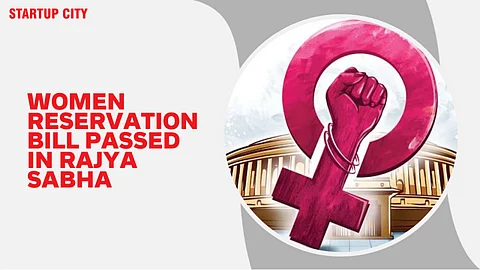Women Reservation Bill Passed in Rajya Sabha
On the historic date of September 21, 2023, a momentous occasion unfolded in New Delhi. The 128th Constitution Amendment Bill of 2023 achieved a remarkable feat by securing unanimous approval in the Rajya Sabha.
Dubbed 'The Constitution (One Hundred and Twenty-Eighth Amendment) Bill, 2023,' this legislation marks a significant milestone in India's political landscape. Its main provision entails the reservation of 33%, or one-third, of seats in both the Lok Sabha and state Assemblies for women.
Earlier in the week, on Wednesday, September 20, 2023, this pivotal amendment garnered a decisive two-thirds majority in the Lok Sabha.
With the unanimous endorsement it received from the Rajya Sabha, this transformative bill has now passed both houses of Parliament, underscoring a momentous step towards achieving gender equality within India's legislative bodies and etching a crucial chapter in the nation's history.
Remarkably, the Women's Reservation Bill found its place as the inaugural law passed in the newly constructed Parliament Building. With a resounding 214 votes in favour and none against, it received unanimous approval in the Upper House under the vigilant eye of Chairman Jagdeep Dhankhar, with no abstentions.
This remarkable accomplishment served as the culmination of a special parliamentary session, highlighting the paramount importance of gender equality in Indian politics.
Prime Minister Narendra Modi
Prime Minister Narendra Modi hailed the passage of the women's quota bill as a watershed moment in the nation's democratic journey. He expressed profound gratitude to all the Rajya Sabha members who rallied behind the Nari Shakti Vandan Adhiniyam.
In a post on WhatsApp Channels, PM Modi extended congratulations to the 1.4 billion Indians and extended his heartfelt thanks to the Rajya Sabha MPs for their unanimous support.
He emphasised the significance of this legislation, which signifies a resolute commitment to ensuring women's voices play a pivotal role in the nation's decision-making processes.
The 'Nari Shakti Vandan Adhiniyam,' or Women's Reservation Bill, seeks to reserve 33% of seats for women in the Lok Sabha, state legislative assemblies, and the Delhi assembly. However, it does not extend to the Rajya Sabha or state Legislative Councils.
The implementation of seat reservations will come into effect after the completion of delimitation following the release of relevant figures from the first census.
In the Lok Sabha, the bill received overwhelming support, with 454 members in favour and just two opposing it. In the Rajya Sabha, it passed unanimously, marking a historic moment. This bill, which had languished for over 25 years, finally saw the light of day during a special parliamentary session.
Union Home Minister Amit Shah
Union Home Minister Amit Shah lauded the bill's passage, noting that where there is a will, there is a way.
He celebrated it as a historic milestone on the path to equitable governance and emphasised that Prime Minister Modi's commitment to gender equality and inclusive governance sends a powerful global message.
He expressed gratitude to Modi Ji and congratulated every citizen on this significant achievement.
Union Finance and Corporate Affairs Minister Nirmala Sitharaman
Minister Nirmala Sitharaman underscored the importance of building consensus for the economic and social empowerment of women.
Responding to Opposition criticism regarding the timing of the bill's introduction after nine years, she pointed out the government's numerous initiatives for the socio-economic empowerment of women since 2014.
Sitharaman highlighted key programs, including the distribution of over 9 crore gas connections under Ujjwala, the construction of 11.72 crore toilets, and the Beti Padhao, Beti Bachao Yojana, aimed at achieving gender balance.
Additionally, she mentioned the extension of paid maternity leave from 12 to 26 weeks and the provision of 9.82 crore paid tap connections.
Sitharaman noted that the government has introduced reservations for women constables in the Central Armed Police Forces and has opened up opportunities for women in institutions like the National Defence Academy and Sainik Schools.
These measures collectively demonstrate the government's unwavering commitment to advancing the status and opportunities of women in India.
Drawing connections between women's empowerment and significant policy changes, such as the revocation of Article 370 and the criminalisation of instant triple talaq, Sitharaman highlighted that Article 370 had previously prevented women who married outside the state of Jammu and Kashmir from inheriting property.
She also emphasised that the government's focus has always been on justice for women rather than mere appeasement.
Regarding the question of the special session, Nirmala Sitharaman explained that the government's intention was to inaugurate the new parliamentary building with the passage of this vital legislation.
She expressed gratitude to members from various political parties for their support in this endeavour.
Regarding the delay in delimitation until 2026, she cited the 42nd Constitutional Amendment Act, which was enacted during the Emergency, as the reason for freezing the date until 2000. Subsequently, in 2002, it was again frozen until 2026.
Sitharaman pointed out that Article 82 mandates seat readjustments after each Census, not only in the Lok Sabha but also within states.
In response to criticism from Congress member K C Venugopal about senior BJP leaders voting against the Constitutional Amendment of 1989 for women's quota in local bodies, Sitharaman noted that opposition to the amendment was not limited to one party.
She highlighted that several regional leaders, including M Karunanidhi, Jyoti Basu, and N T Rama Rao, had also opposed it, as they believed it could encroach upon states' powers.

